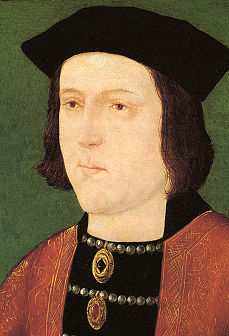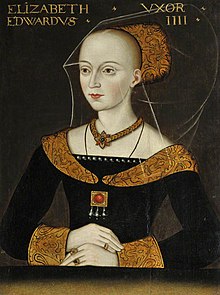Queen Elizabeth II - her parents choice of name for her was considered by some to be rather daring
It's not really a surprise that the first to go against the grain was Elizabeth Woodville. She'd started as she meant to go on by switching sides in the Wars of the Roses after seducing the younger Edward IV beneath an oak tree in Northamptonshire. It took her six years to give her king his longed for heir and when she did, she named him after the king rather than his father as was traditional.
Edward IV, one of the handful of kings in English history to have his son and heir named after him
There are several reasons why this baby became an Edward rather than a Richard. Firstly, Elizabeth liked to be different and she liked things her way and by choosing to honour the baby's father rather than his dead grandfather, she was setting a new trend. Secondly, and perhaps most importantly, Richard was also the name of the Earl of Warwick. And just months before her son was born he had switched his allegiance from Edward to the House of Lancaster once more. On the day the future king arrived, November 2nd 1470, Elizabeth was in sanctuary in Westminster Abbey while Warwick held the ill and frightened Henry VI on the throne as his puppet king. Edward IV was in exile, plotting his comeback but certain that if he set foot in England again and failed to topple Warwick, he would die. To name a son Richard at that point was unthinkable. Lastly, Elizabeth already had a son with that name. Her youngest child with her first husband, Sir John Grey, was by then around 11 years old and hiding in the abbey with his mother.
Elizabeth Woodville, queen consort of England, had two sons called Richard making calling them in for their dinner a bit tricky
But having one Richard in the family didn't stop Elizabeth using the name again three years later. By the time she and Edward welcomed their second son together, the king was king once more and Warwick had been dead for two years. The latest Richard in her family was made Duke of York but disappeared along with little Edward ten years later when another Richard, their uncle, was battling to grab the throne.
The other Elizabeth to go completely off message was the daughter of Edward IV and his Woodville wife. She married Henry Tudor in 1486 and settled into being a quiet, background queen consort even though her claim to the throne was better than that of her husband. Their first child was born later that year and named Arthur. He is, so far, the only eldest son of a monarch to bear that name.
Arthur, Prince of Wales and heir to Henry VII until his death in 1502
Henry and Elizabeth wanted to create a new Camelot and in the months before their child's birth had drawn up a family tree linking the Tudors to the court of King Arthur. Their son's arrival marked, for them, the beginning of a new dynasty that would stretch far into the future. But Arthur died, aged 15, in 1502 and never became king. His widow did become queen consort - Catherine of Aragon married Arthur's brother when he became Henry VIII in 1509. But the hoped for dynasty of course never arose and while three of Henry and Elizabeth's grandchildren ruled England, they left no heirs. The throne went to the descendants of one of their daughters instead.




No comments:
Post a Comment